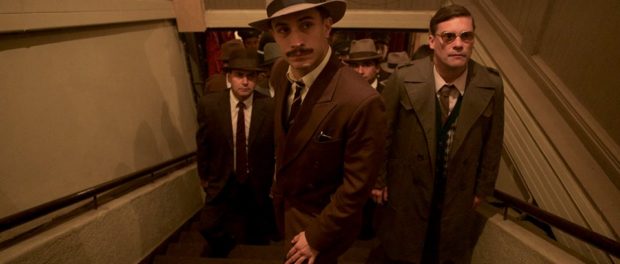Neruda: A Poetic Police Chase
Neruda is about a Nobel Prize winning poet, a communist-turned-fugitive and national hero of Chile, who was renowned around the world for not just his poetry, but other facets of his colourful life. Clearly, director Pablo Larraín had a lot to work with, and he did well. The film is poetry: it’s a long and lyrical compilation of the battle of the mind between renegade communist and poet Pablo Neruda (Luis Gnecco) and an ambitious, relatively unknown police officer Oliver Peluchonneau (played by the handsome heartthrob Gael Garcia Bernal), whose only goal is to make a name for himself by capturing this famous fugitive.
We meet Neruda and his artist wife Delia (Mercedes Morán) who have just been informed by the Politburo of the Communist Party of Chile that most of the office bearers, including Neruda, must go underground, as the government is looking to arrest them and put them in prison. This declaration is coupled with the simultaneous rumblings that Neruda brought to the Chilean parliament as a Senator and the far-reaching impact his poems have on the mind space of the Chilean people.
Neruda and Delia hide at a friend’s house, where they are assured to never be found. This confinement takes a toll on both of them. While Neruda battles intellectual imprisonment, his wife is nagging him for want of her old life. The first part of the film is gifted with brilliant editing, as the narrative moves between characters and realities, and is also trying to set up the duel that will ensue between Neruda and Peluchonneau. In addition to the brilliant writing by Guillermo Calderón, Hervé Schneid gives the film razor sharp editing.

Neruda.
From here on, the film becomes incessantly driven by the poetic voice-over of Peluchonneau. He meets Delia, who is now estranged from her husband. She puts all of Peluchonneau’s life into the fictional world of Neruda and tells him that he is a character that the great poet created. She further slights him by relegating him to a character with a secondary role, someone that has no place in Neruda’s thought process. In his attempts to claim his role and place in the search for Neruda, his self-proclamation of being the protagonist of the poet’s writing, Peluchonneau chases the poet to the farthest ends of his flight.
Neruda – the narrative, the experience – is a writer’s delight that brings to life the literary indulgences of a cinematic piece filled with texture, intrigue and a poetic contest for intellectual supremacy.

Neruda.
As Peluchonneau closes in on his prey, he yells out his name and only out of intrigue does Neruda respond. He can’t stop himself from responding to someone who is calling out to him in the vast, dreary solitude of the winter wasteland. Neruda is able to escape Chile and continue his forays of political poetry, inspiring the world to take to arms and keep the worker’s struggles going. He is stereotyped in the film as this flesh indulgent man (which he may have been in real life too), who performed orgies just as many times in real life, as he did in his lyrics. But that is not his weakness, but just another shade of his human experience. Peluchonneau for his part is able to take comfort that his immortality, assured merely by the utterance of his name by Neruda, was enough.
Neruda is now playing in theatres.




